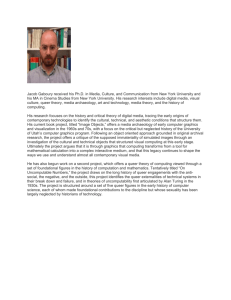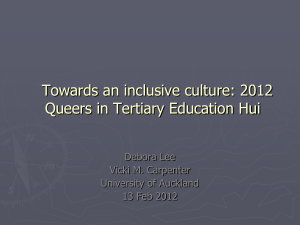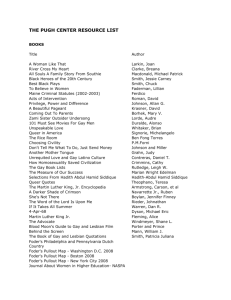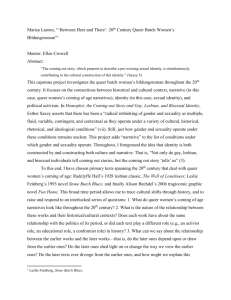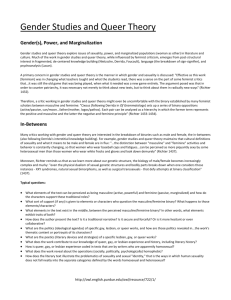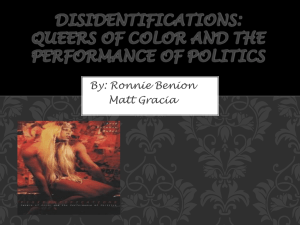Inside/OUT - University of Alberta
advertisement
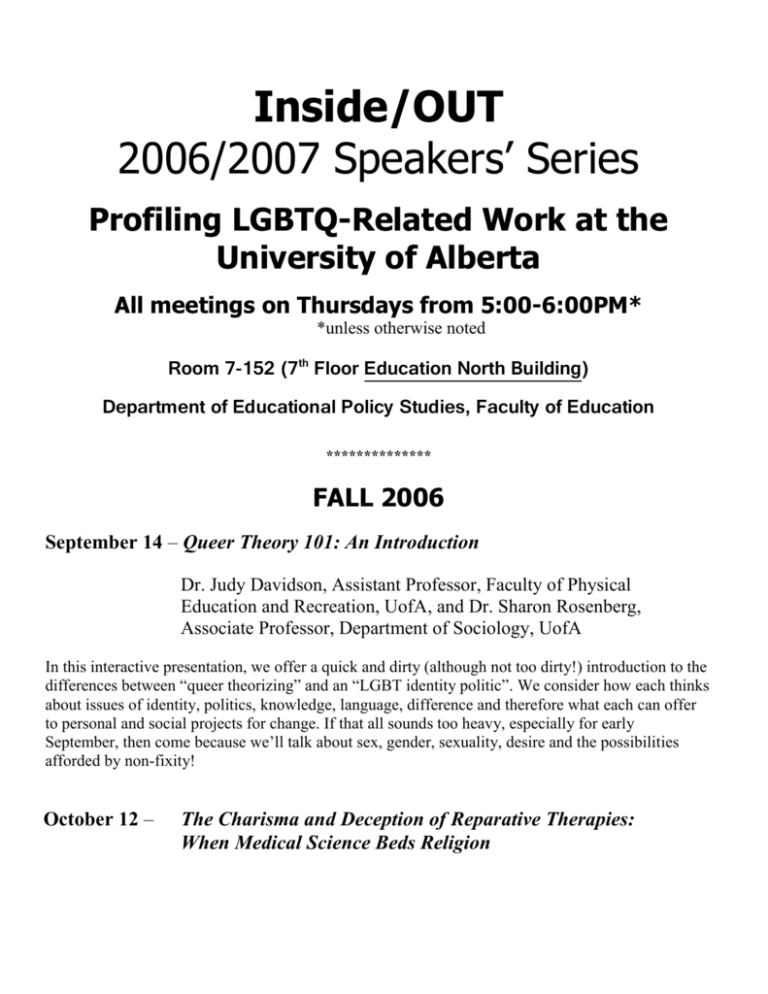
Inside/OUT 2006/2007 Speakers’ Series Profiling LGBTQ-Related Work at the University of Alberta All meetings on Thursdays from 5:00-6:00PM* *unless otherwise noted Room 7-152 (7th Floor Education North Building) Department of Educational Policy Studies, Faculty of Education ************** FALL 2006 September 14 – Queer Theory 101: An Introduction Dr. Judy Davidson, Assistant Professor, Faculty of Physical Education and Recreation, UofA, and Dr. Sharon Rosenberg, Associate Professor, Department of Sociology, UofA In this interactive presentation, we offer a quick and dirty (although not too dirty!) introduction to the differences between “queer theorizing” and an “LGBT identity politic”. We consider how each thinks about issues of identity, politics, knowledge, language, difference and therefore what each can offer to personal and social projects for change. If that all sounds too heavy, especially for early September, then come because we’ll talk about sex, gender, sexuality, desire and the possibilities afforded by non-fixity! October 12 – The Charisma and Deception of Reparative Therapies: When Medical Science Beds Religion Dr. André P. Grace, Professor, Department of Educational Policy Studies, UofA In this presentation I examine the history and resurgence of interest in sexual reorientation or reparative therapies. I begin with a critique of the contemporary “ex-gay” movement, interrogating Exodus as the prototype of a politico-religious transformational ministry that works to “cure” homosexuals. I examine how Exodus utilizes ex-gay testimony to deceive harried homosexuals looking for escape from the effects of internalized and cultural homophobia. Next I investigate how reparative therapies function as orthodox treatments that charismatically meld conservative religious perspectives with medical science to produce a pseudo-science promising to treat homosexuality effectively. In this regard, I assess the ongoing debate regarding gay-affirming versus reparative therapies by first looking at the history of medicalizing homosexuality, and then surveying the debate spurred by Robert L. Spitzer’s research. I conclude with a consideration of research needed to measure whether efficacious change in sexual orientation is possible. October 26 – Tacky Lives, Livable Lives: Linguistic Markets and Queer Identities Chris Samuel, former Co-Host, CJSR Radio’s GayWire, Freelance Writer, and Researcher Two moments in pop culture (film and television) will be used as starting points for a discussion of “tact” and “intelligibility” in articulating queer praxis. Bourdieu’s conception of tact as exemplary participation in linguistic markets will be considered with and against Butler’s analysis of “intelligible subjects” leading “livable lives”. The goal of this consideration will be to interrogate the possibility and desirability of a normative queer political agenda. The presentation will trouble the tension between political efficacy and the queer goal of destabilizing the very means by which contemporary social movements have been successful. In particular, the ongoing battle over samesex marriage poses theoretical and practical problems for those queers who support the nominally anti-homophobic subtext of the fight, but worry that the battle may simply re-locate and reinforce queer marginality. November 9 – Creating a Canadian “Lesbian” Theatre Canon Dr. Rosalind Kerr, Associate Professor, Department of Drama, UofA This talk introduces the recently published volume: Lesbian Plays: Coming of Age in Canada (Playwrights Canada Press, 2006). As the editor of this volume, I discuss the need to account for the lesbian theatrical presence over the past 20 years. I refer to the work of the 13 playwrights/performance artists to show how lesbian theatre mirrors the changes that have brought lesbians into greater prominence in Canadian society. In addition to exploring the intersections of lesbian sexuality and nationality in a general sense, I draw upon examples from the collected plays to highlight how lesbian playwrights have portrayed their own particular regions of the country. In reflecting upon their mainly urban experiences, the playwrights demonstrate how lesbian theatre artists consider themselves to have acquired an audience base. Plays and performance artists to be briefly introduced include: Alex Butler, Shawn Dempsey and Lorri Millan, Lisa Lowe, Vivienne Laxdal, Lisa Walter, Susan G. Cole, Alex Bulmer, Diane Flacks, Natalie Meisner, Kathleen Oliver, and Corrine Hodgson. The goal of this presentation is to demonstrate how establishing a lesbian theatre canon enriches and expands our understanding of contemporary Canadian queer theatre, which so far has been mostly dominated by gay male playwrights. December 7 – “Family Feeling:” The Rise and Fall of Anti-Family Politics Dr. Cindy Patton, Canada Research Chair in Community, Culture and Health, and Professor of Sociology/Anthropology and Women's Studies, Simon Fraser University, British Columbia “Gay marriage” activism has provoked debate between gay liberationists and proponents of gay marriage as a form of civil right. Many activists are concerned about the form that “gay marriage” politics have taken, but are nonetheless deeply moved by, for example, the recent wedding of the “gay mounties”. This talk employs a little-known work on “family feeling” by Pierre Bourdieu to offer an account of the affective changes that occurred–or did not occur–from the original ambitions of the gay liberation movement to the present. While ultimately critical of gay marriage activism, Patton suggests where there might be common ground for reconnecting the 1970s anti-family activism with contemporary “post-marriage” politics. Cindy Patton holds the Canada Research Chair in Community Culture and Health at Simon Fraser University in British Columbia, is a Senior Scholar of the Michael Smith Foundation for Health Research, and Professor of Sociology/Anthropology and Women’s Studies. She was an AIDS activist and community organizer throughout the 1980s, and has subsequently worked as a researcher and scholar. Her publications include: Inventing AIDS (1990); Last Served? Gendering the HIV Pandemic (1994); Fatal Advice (1996); Queer Diasporas (w/Benigno Sanchez-Eppler 2000), Globalizing AIDS (2002), and a forthcoming study of post-WWII popular culture, Acting Real (2007). She directs a qualitative research lab (the Health Research and Training Facility (http://health.arts.sfu.ca) with a focus on community based research, and which provides substantial pro-bono work in research design and evaluation for small community groups. The larger research program includes analysis of neighbourhoods coping with HIV, with an emphasis on the role of housing and the particular problems of poor people. In addition, she continues to publish critical essays in media studies. This event made possible by financial support from the Canada Research Chair in Philosophy of Gender and Sexuality. ************* WINTER 2007 January 25 – Queer Covers: Big Mama Thornton, Lesbians on Ecstasy, and the Recycling of Political Culture Dr. Judith Halberstam, Professor, Department of English, and Director of the Centre for Feminist Research, University of Southern California In this presentation I explore the meaning of the “cover version” in relation to two very different queer cultural performances. In the first example, I consider the life and career of the very masculine and very tough blues singer, Big Mama Thornton, and I look at the process by which Elvis Presley records a song first popularized by Big Mama Thornton, but turns it into a hit. While the history of Elvis has often been told as the history of cultural theft and in terms of the absorption of Black cultural influence into white cultural production, only rarely is this process described in terms of the “straight” absorption of “queer” cultural influence. Thornton, in her mode of dress, her affect, her phrasing and her bluesy performance can easily be categorized as queer, and her effect upon Elvis, his masculinity, his way of dancing, his singing, has yet to be assessed. In my second example, I turn to the Montreal based Lesbians on Ecstasy (LOE), a band who have turned the cover version into a sensibility as well as a mode of politicization. I use Big Mama Thornton and LOE to examine the relations between “lesbian” identity, inauthenticity, sincerity, imitation, and performance. Judith “Jack” Halberstam teaches courses in queer studies, gender theory, art, literature and film. Halberstam is the author of Female Masculinity, The Drag King Book, Skin Shows: Gothic Horror and the Technology of Monsters and a new book from NYU Press titled In a Queer Time and Place: Transgender Bodies, Subcultural Lives. Judith “Jack” Halberstam 2006/07 Inside/OUT Keynote Lecture This event made possible by financial support from the Department of English and the Canada Research Chair in Philosophy of Gender and Sexuality. February 15 – Cruising Queer Constellations of Urban Space or Adventures in New Narrative Dr. Dianne Chisholm, Professor, Department of English and Film Studies, UofA Where standard urban histories present a predictable narrative of progress, queer city writing presents erratic memoirs of colliding dreams and catastrophes. Late last-century queer avant-garde prose constellates lived inner-city space with characters of the “gay village,” “gay mecca,” “gai Paris,” “the lesbian flaneur,” “the lesbian bohéme,” and other urban phantasmagoria that juxtapose revolutionary utopia paradoxically against commodity spectacle. (Un)canny fictions, these queer urban narratives cruise the city of late modernity hand-in-hand with Walter Benjamin and, like him, they deploy a peripatetic narrative that conjures critical desire by drifting into spaces of shocking collective memory and unfinished history. Drifting with this narrative, readers revisit the gay bathhouse and other archetypal dreamhouses as haunting fossils of social transformation and ruins of cultural potential. This talk will introduce listeners to new practices of walking, seeing, citing, and remembering the city as devised by such contemporary queer writers Samuel Delany, Robert Glück, Gail Scott, Sarah Schulman, Eileen Myles, Gary Indiana, and David Wojnarowicz. March 21 – Hate Crimes and Human Rights: What You Should Know and What You Can Do To Create a Safer Campus Community Constable Robinder Gill, Edmonton Police Service’s Hate and Bias Crime Unit and Kristopher Wells, Member, Edmonton Police Chief’s Advisory Council Drawing upon police counter-intelligence, this presentation examines resurging extremism and hate and bias crime in Alberta. In our discussion we highlight current statistics, define what constitutes a hate/bias crime or incident, and outline proper reporting mechanisms. We also identify warning signs, symbology, and coded messages utilized by extremists, anti-government radicals, and white supremacists. We theorize how these “cells” and/or “lone wolves” are often motivated to engage in hate and bias crimes by their disenfranchisement and alienation as youth, which we posit as demonstrating the need for educational intervention. We emphasize how extremist ideologies position minorities as the monstrous “Other”, and like all monsters they are created in order to die (Ingebretsen, 2001). As both the subjects and objects of violence, hate-motivated crimes are intended to dehumanize and instill fear in both the individuals who are attacked and their respective communities. To conclude we explore this politics of fear and argue that all bodies matter and deserve equal protection under the law. Hate Crimes and Human Rights is a special community presentation sponsored by the University of Alberta’s Office of Human Rights in recognition of March 21 as the International Day for the Elimination of Racial Discrimination. 5:00-6:30pm Room 165 Education South Building Sign language interpreting and real time captioning services will be provided. March 29 – Moving Towards Inclusive Pedagogies: The Laramie Project, Lord Byng Secondary School, and Lessons in Acceptance Wes D. Pearce, Theatre Department, University of Regina “One British Columbia school board calls The Laramie Project profane, another school board calls it profound.” In late September of 2005 the School District #36 (Surrey, BC) found itself the centre of a firestorm around charges of homophobia, censorship, and intolerance. At the centre of this controversy was a decision by the School District to “postpone” a production of Moises Kaufman’s The Laramie Project that was to have been mounted at Elgin Park Secondary School. Charges and counter-charges flew but this protest once again painted Surrey as one of the most intolerant school systems in the country. In January 2006, independent of (but coloured by) the recent events in Surrey, Vancouver’s Lord Byng Secondary School presented The Laramie Project. The production at Lord Byng was, I believe, unique in Canada both in terms of the curricula that was developed around the play but also given the fact that many of the same diverse communities and constituents which sought to ban the production in Surrey embraced the production in Vancouver. This presentation is an examination of the development and implementation of the phenomenal educational program that the staff, students and Lord Byng community developed around The Laramie Project. This educational project garnered national attention, and throughout its development and implementation demonstrated creativity, thoughtfulness, a commitment to social change and a dynamic/proactive response to Kaufman’s play. The immediate, not to mention long term (and extremely positive) after effects, of this pedagogical approach demonstrated that the concerns of the Surrey School District were unfounded, hysterical, and homophobic. April 19 – Thinking Queerly: Legal Theory and Educational Politics and Policies Dr. Catharine Lugg, Associate Professor, Department of Educational, Theory & Policy at the Graduate School of Education, Rutgers University, the State University of New Jersey This talk looks at how law and legal thinking can shape “who gets what, when and how” (to paraphrase Harold Lasswell) in public schooling. In particular, I draw on queer legal theory and its understandings of how the Canadian and US constitutions constrain and try to confine queer identities, and how these understandings, in turn, can shape educational policies and politics surrounding K-12 public education. In particular, I focus on “what has changed for public schools” since the landmark US Supreme Court decision, Lawrence v. Texas (2003), which invalidated all laws banning consensual sodomy. Professor Lugg is currently an associate professor of education, in the Department of Educational, Theory & Policy at the Graduate School of Education, Rutgers University. She is also a Senior Associate Editor for the Journal of Gay and Lesbian Issues in Education (James T. Sears, founder and editor), and an Associate Director of Publications for the University Council for Educational Administration. UCEA is a consortium comprised of over 70 doctoral granting institutions in Canada, the UK and the US. Recent publications include, “Thinking about sodomy: Public schools, legal panopticons and queers (2006),” and “One nation under God? Religion and the politics of education in a post 9/11 America (2004),” both in Educational Policy. All meetings on Thursdays from 5:00-6:00PM* Room 7-152 (7th Floor Education North Building) Department of Educational Policy Studies, Faculty of Education *Venue and time may be subject to change due to audience interest and participation. After each presentation we invite you to join us at the Sugar Bowl (10922 88 Avenue NW) to continue to network and socialize. Inside/OUT is a campus-based network for lesbian, gay, bisexual, trans-identified, queer (LGBTQ) and allied faculty, graduate students, academic, and support staff of the University of Alberta. We also invite undergraduate students and interested members of the community to attend. Inside/OUT is designed to provide a safe and confidential space on the university campus for LGBTQ persons and their allies to network, socialize, and have fun in a supportive and welcoming environment. For more information regarding Inside/OUT, please contact Kristopher Wells <kwells@ualberta.ca> or Marjorie Wonham <mwonham@ualberta.ca> or visit http://www.mailman.srv.ualberta.ca/mailman/listinfo/inside-out to join the confidential Inside/OUT listserv. Funding and support for the Inside/OUT 2006/07 Speakers’ Series has been generously provided by the following sponsors: Special thanks to the Department of Educational Policy Studies for providing departmental resources and meeting space.
